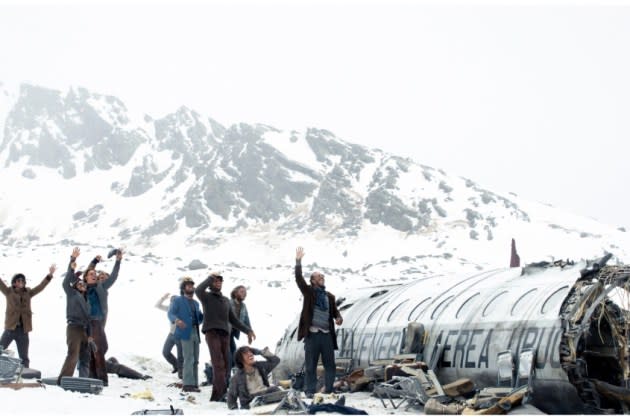Read also:
How to Watch FX Live Without CableHow To Watch AMC Without CableHow to Watch ABC Without CableHow to Watch Paramount Network Without CableJ.A. Bayona directs a heartbreaking adaptation of a true-life tale of tragedy & miracles.
Though we joke about the smallest inconveniences rendering us helpless, in truth the human will to survive cannot be underestimated. When confronted with imminent death, we can and will resort to extreme means to escape it, sometimes in ways that might shock and horrify those who weren’t there. One such story was Aron Ralston, a hiker who was forced to break and cut his own arm off after he was trapped by a fallen boulder, as depicted in 2010’s 127 Hours. Another was a 1972 plane crash in the Andes mountains, after which the survivors, faced with subzero temperatures, no food, and no plant life or animals to be found, eventually resorted to cannibalism to avoid starvation.
The Andes plane crash story was adapted for film a number of times, including the trashy, exploitative Survive!, and 1993’s competently made but whitewashed Alive, in which Ethan Hawke was cast as a character named Nando Parrado. Now J.A. Bayona, whose 2012 film The Impossible was also a harrowing tale of survival, takes a turn with Society of the Snow, a gripping, heart-wrenching look at the emotional toll such an unthinkable event takes on those who somehow came out of it alive, if not exactly well.
The young men boarding a chartered airplane to Chile at the beginning of the film don’t have a care in the world. Many of them are members of a Uruguayan rugby team traveling to play in a match, but also looking forward to partying and picking up girls. Even when the plane hits some heavy turbulence, when a lot of us would be gripping our armrests and making peace with our gods, they’re laughing and cracking jokes. When you’re a certain age, you don’t think you can ever die.
And then due to pilot error the plane crashes, a nightmare that spares nothing in its depiction of crushed bodies and broken limbs, not to mention the shock, disorientation and horror in the immediate aftermath. The survivors are faced with two insurmountable situations, the loss of many of their teammates (not to mention some of their friends and family), and the fact that the remote location of the crash makes rescue unlikely. In fact, as we later learn from a radio report, no one has ever survived being stranded in that area. It’s simply too cold, too treacherous, too inhospitable to living things.

As the number of survivors (most of them in just their late teens and early twenties) gradually dwindles due to the cold, injuries from the crash, and later an avalanche, their already meager food supply disappears. The remaining survivors must make a ghastly decision: death by starvation, or eat the flesh of the dead.
To say that there isn’t much of a plot in Society of the Snow isn’t a criticism, just an observation. It’s not a spoiler (unless you don’t have access to Wikipedia) to reveal that, miraculously, some of the survivors were eventually rescued, incredibly more than two months after the crash, though it took the brave decision of Nando Parrado and Roberto Canellas to hike for miles with the bare essentials until they found help. Though the reveal that some of the dead were used for food was initially met with shock by the press and public, it quickly died down, and the young survivors were later treated as heroes forced to act in a situation virtually no one else would ever find themselves in.
Without the element of suspense, the film focuses predominantly on both the survivors’ refusal to give up (either due to faith in God or plain stubbornness), even when the chance of rescue grows ever more remote, and their anguish over what they must do to keep overwhelming hunger at bay. Cannibalism has long been used as an often cheap shock tactic in movies, with a horror angle: nobody wants to have to eat anyone, but maybe they kind of do, a little? The entire premise of Yellowjackets, loosely inspired by the Andes plane crash, is that there’s a sinister edge to the survivors turning to cannibalism, and they walked away from it with shadowy dark sides they can barely contain.
Here, it’s clearly a desperate measure that no one gains anything from except guilt and additional grief. As in real life, they attempt to eat almost anything else remotely edible, even tree bark and bits of leather, before giving in to the decision to eat their friends. It’s easy to say what one would or wouldn’t do in a situation so unlikely that’s it almost not even worth considering, but Society of the Snow makes it clear that sometimes there’s no room for judgment and self-righteousness when your very life is on the line.
It was a smart, effective decision to use a mostly unknown, Spanish-speaking cast, including Agustin Pardella as Nando and Matias Recalt as Roberto. These are just ordinary boys, looking forward to a trip of rugby and leisure, suddenly finding themselves in a nightmare. Their industriousness and desire to look out for each other is poignant: in any other movie they’d be splitting ranks and battling each other for supremacy, Lord of the Flies-style. Here, knowing they’re all faced with the same very low odds of getting out of there alive, they work together, doing the best they can, with what they have, even if what they have is an unimaginable choice.
Society of the Snow is now available on Netflix.